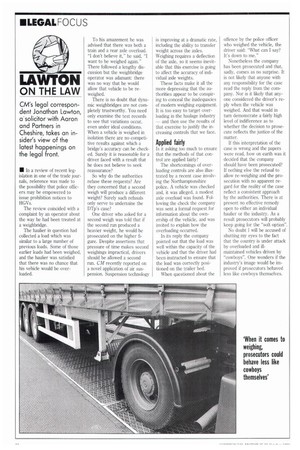LAWTON
Page 20

If you've noticed an error in this article please click here to report it so we can fix it.
ON THE LAW
CM's legal correspondent Jonathan Lawton, &solicitor with Aaron and Partners in Cheshire, takes an insider's view of the latest happenings on the legal front.
• In a review of recent legislation in one of the trade journals, reference was made to the possibility that police officers may be empowered to issue prohibition notices to HGVs.
The review coincided with a complaint by an operator about the way he had been treated at a weighbridge.
The haulier in question had collected a load which was similar to a large number of previous loads. Some of those earlier loads had been weighed, and the haulier was satisfied that there was no chance that his vehicle would be overloaded. To his amazement he was advised that there was both a train and a rear axle overload. "I don't believe it," he said, "I want to be weighed again." There followed a lengthy discussion but the weighbridge operator was adamant: there was no way that he would allow that vehicle to be reweighed.
There is no doubt that dynamic weighbridges are not completely trustworthy. You need only examine the test records to see that variations occur, even under ideal conditions. When a vehicle is weighed in isolation there are no competitive results against which a bridge's accuracy can be checked. Surely it is reasonable for a driver faced with a result that he does not believe to seek reassurance?
So why do the authorities refuse these requests? Are they concerned that a second weigh will produce a different weight? Surely such refusals only serve to undermine the DTp's case?
One driver who asked for a second weigh was told that if the second run produced a heavier weight, he would be prosecuted on the higher figure. Despite assertions that pressure of time makes second weighings impractical, drivers should be allowed a second run. CM recently reported on a novel application of air suspension. Suspension technology is improving at a dramatic rate, including the ability to transfer weight across the axles. Weighing requires a deflection of the axle, so it seems inevitable that this exercise is going to affect the accuracy of individual axle weights.
These facts make it all the more depressing that the authorities appear to be conspiring to conceal the inadequacies of modern weighing equipment. It is too easy to target overloading in the haulage industry — and then use the results of that exercise to justify the increasing controls that we face.
Applied fairly
Is it asking too much to ensure that the methods of that 'control are applied fairly?
The shortcomings of overloading controls are also illustrated by a recent case involving the Northamptonshire police. A vehicle was checked and, it was alleged, a modest axle overload was found. Following the check the company was sent a formal request for information about the ownership of the vehicle, and was invited to explain how the overloading occurred.
In its reply the company pointed out that the load was well within the capacity of the vehicle and that the driver had been instructed to ensure that the load was correctly positioned on the trailer bed.
When questioned about the offence by the police officer who weighed the vehicle, the driver said: "What can I say? It's down to me."
Nonetheless the company has been prosecuted and that, sadly, comes as no surprise. It is not likely that anyone with any responsibility for the case read the reply from the company. Nor is it likely that anyone considered the driver's reply when the vehicle was weighed. And that would in turn demonstrate a fairly high level of indifference as to whether the decision to prosecute reflects the justice of the matter.
If this interpretation of the case is wrong and the papers were read, how on earth was it decided that the company should have been prosecuted? If nothing else the refusal to allow re-weighing and the prosecution with no apparent regard for the reality of the case reflect a consistent approach by the authorities. There is at present no effective remedy open to either an individual haulier or the industry. As a result prosecutors will probably keep going for the "soft option".
No doubt I will be accused of shutting my eyes to the fact that the country is under attack by overloaded and ill maintained vehicles driven by "cowboys". One wonders if the industry's image would be improved if prosecutors behaved less like cowboys themselves.
































































































